A fine art photographer and daughter, painstakingly documents her mother’s battle with Frontal Temporal Dementia, and changing family dynamics

Kiran�s husband has reduced his working hours and takes her to the beach as often as he can. �It�s their happy place. He used to be the one fussed over, but is now her sole care-giver. My mom used to complain that dad didn�t pay enough
Manjari Sharma, New York-based fine art photographer, knew her mother Kiran Sharma as the loving and hyper-caregiver of their family of four. "She knew all the Beatles songs and could quote Shakespeare," says the 36-year-old, whose India base is her parents- home in Lokhandwala, Andheri. "She was sharp and had a great sense of humour, a performer-s voice, was humble, warm, sophisticated and hospitable."
ADVERTISEMENT
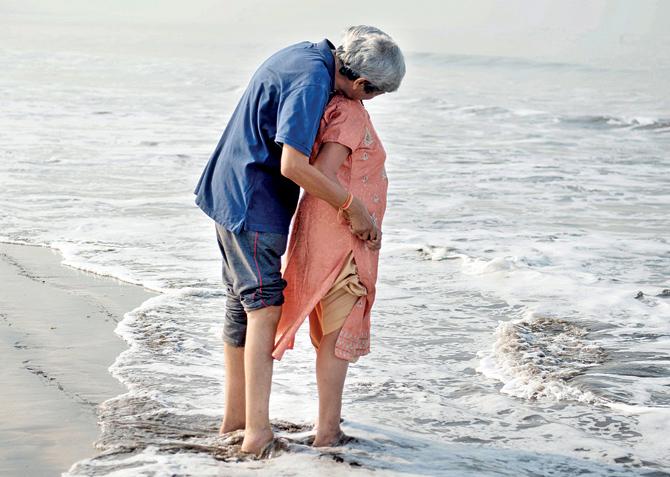
Kiran-s husband has reduced his working hours and takes her to the beach as often as he can. "It-s their happy place. He used to be the one fussed over, but is now her sole care-giver. My mom used to complain that dad didn-t pay enough attention; if only she could see how selflessly he serves her. This makes me think about the marriage vows -To Have and to Hold-. What happens when you can hold, but you cannot have?" says Manjari.
Three years ago, the now 63-year-old, started experiencing acute depression and mood swings. "She-d get stuck in the dark moments of her life, re-live them repeatedly," says Manjari. "She first became hard of hearing and more internalised. The swinging behavioural changes required a high level of patience, especially from papa."
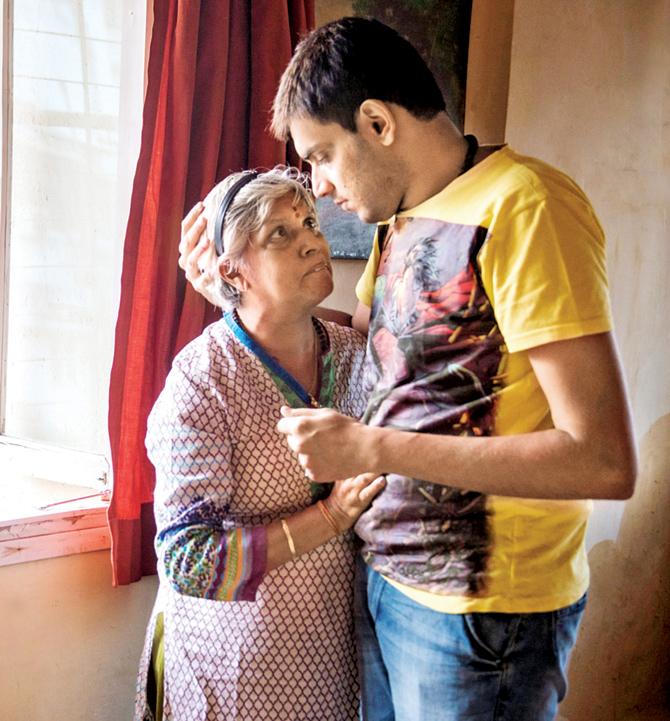
Kiran-s son has a high-functioning social disability called Asperger-s syndrome a mild form of autism. In spite of limited resources for him in India, Kiran did what any sophisticated expert now prescribes — she kept him busy, gave his life structure and taught him to focus his energy. "It is a harsh reality for him to accept this drastic change, since she was his best friend," says Manjari. "All of us grapple with accepting that dementia has no recourse, but for my brother, it will be a steeper climb. During one spell of paranoia, she refused to have her blood drawn for a test. Even my brother, whose condition means he is unable to empathise, told her, -Look mama, it doesn-t hurt. I am going to get it done too.-"
The family consulted doctors and, for the first six months, it seemed that Kiran suffered from clinical depression that manifested itself in hallucinations, paranoia and psychotic episodes. "She developed an obsessive fear of cats and dogs and turned unexpectedly violent towards us and strangers," says Manjari, who made seven trips to India in two-and-half years.

"Mom went through a stage of obsessive chanting," says Manjari. "She would sit in a room reading endless pooja books for as many as six hours and would carry them along everywhere she went."
"She turned into a recluse and became increasingly forgetful about everything from dates to events, and then people."
By mid-2013, Kiran was diagonised with dementia. Emotionally, the family has had to cope with constantly shifting symptoms. As the four learned to accept public embarrassment and come to terms with the degeneration of her condition, Manjari noticed that the dynamic was changing. "As an artiste, I am compelled to point my camera at what my mind cannot escape and the last two years have been all about my mother-s illness. I cannot change it; I can only document it," she says, choosing to feature several of these frames on her Instagram account.
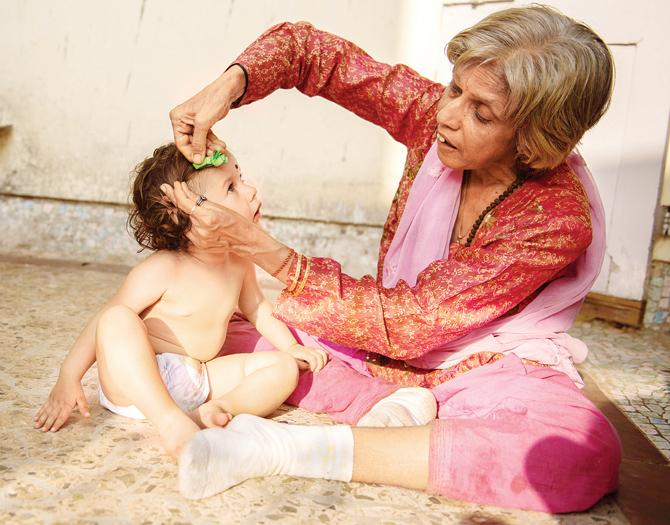
Manjari has not restricted interaction between her three-and-half-year-old daughter Siya Sharma-Gaines and Kiran. "Just as my daughter was starting to make memories, my mother was beginning to lose hers," she says. "I had a beautiful bond with my grandmother and I didn-t want to deprive Siya of hers; so what if her naani is not like the others. Children are very emotionally intelligent and mama, even during her violent episodes, would be very gentle to Siya. Her face lights up when she sees her."
The biggest change this brought into the family was to transform her 64-year-old father Sunil into a hands-on householder. "No one suffers more than the spouse; she has become his baby. My parents were always bonkers about each other, but he has had to learn to run the house, bathe and feed her, be vigilant 24/7 because she has a tendency to wander, all whilst running his business," says Manjari.
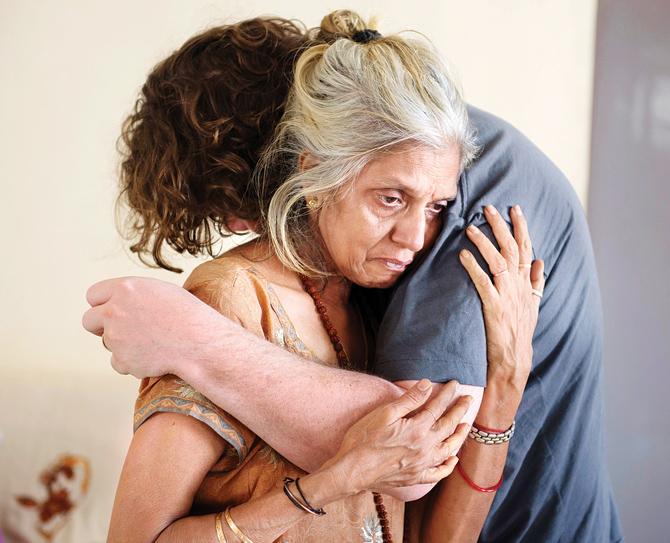
In the acute depression that heralded the illness, Kiran lost 10 kilos. "In this picture, where she is hugging my husband Bill Gaines, she looks defeated," says Manjari.
But this is not a sad story. Society at large — friends, family, watchmen and domestic house help — has become more important than ever.
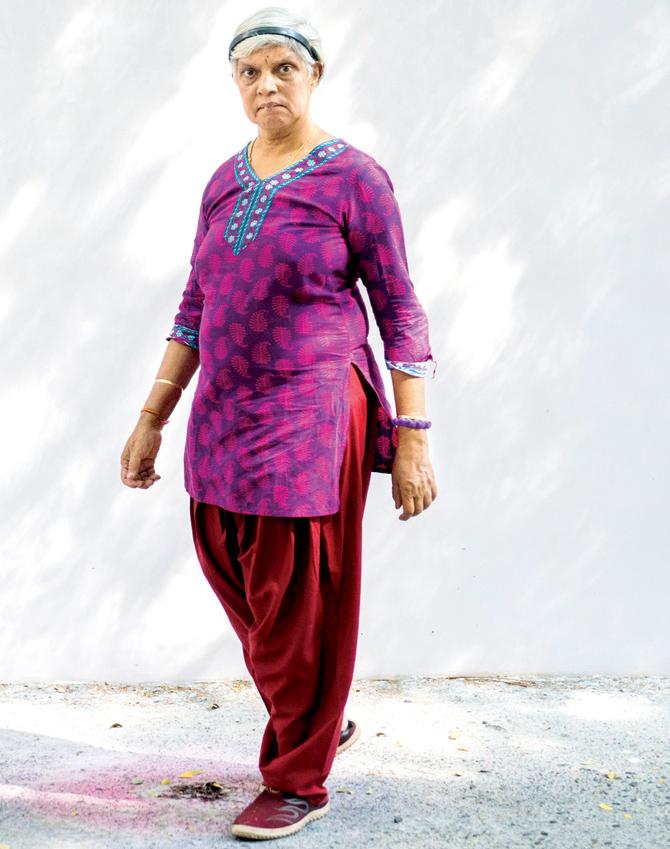
Kiran has now lost all words, vocabulary and coherent speech. She does not recognise her family. "But in some ways," says Manjari, "she knows we are her crew — a people to be trusted or who live with her." Pics/Manjari Sharma
"Emotionally, the Sharma family has truly bonded to help my dad," says Manjari "When you can-t throw money or doctors at a problem, all that remains is how much tolerance your neighbours can extend.
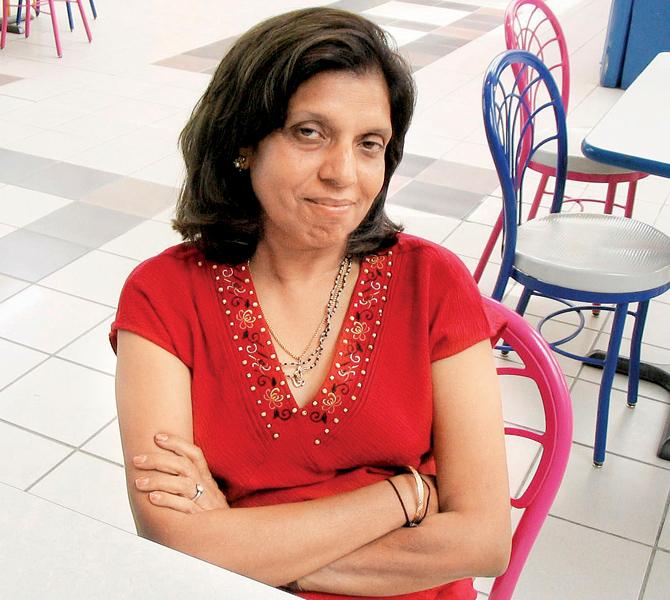
This is an image of Kiran in 2005 when she visited Manjari in USA. Kiran has a Bachelor-s degree in English Literature and would always have soulful music playing in their home. Even now, she reacts to mausic instinctively by flapping her elbows to the beat and the family breaks out into a dance session at least once a day.
I guess, when my mom became the baby, we all had to grow up. Our lives have inter-locked stronger and though we might be fractured from our loss, we are more together than ever," she adds.
 Subscribe today by clicking the link and stay updated with the latest news!" Click here!
Subscribe today by clicking the link and stay updated with the latest news!" Click here!








